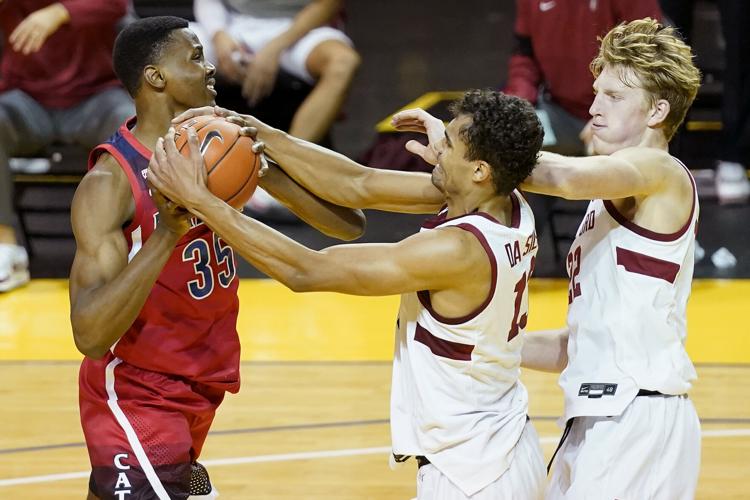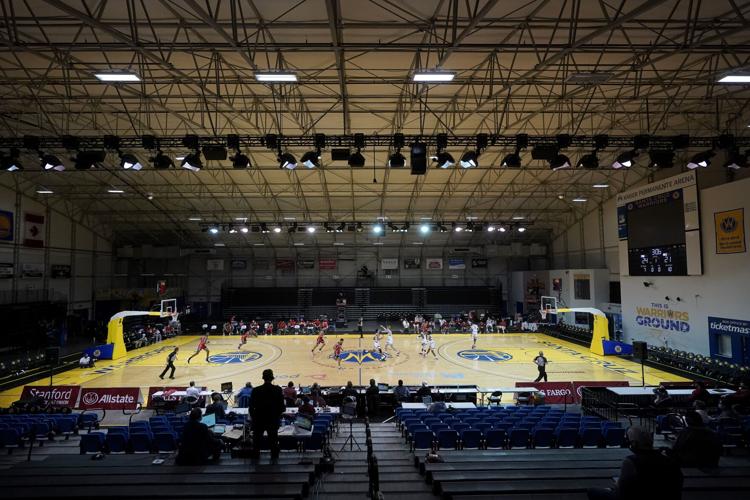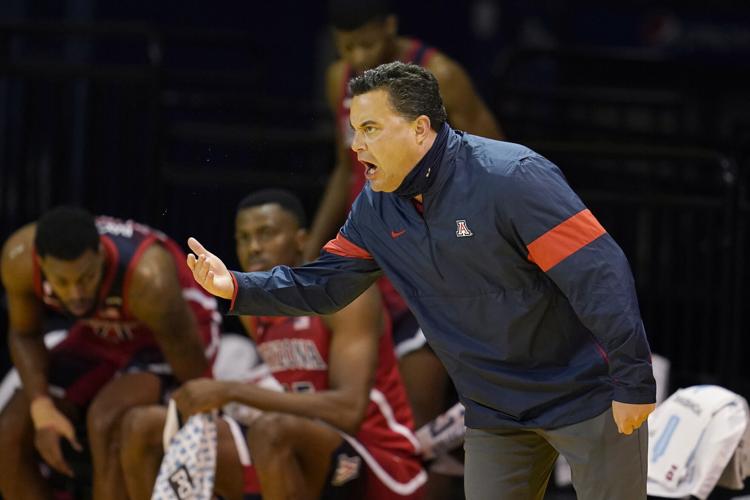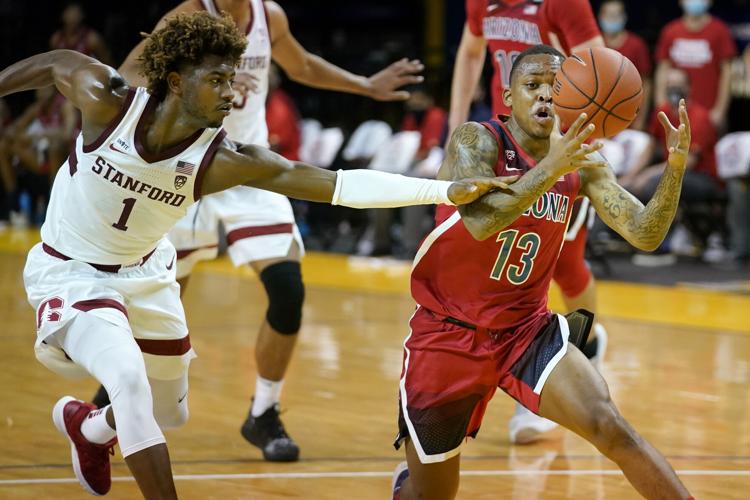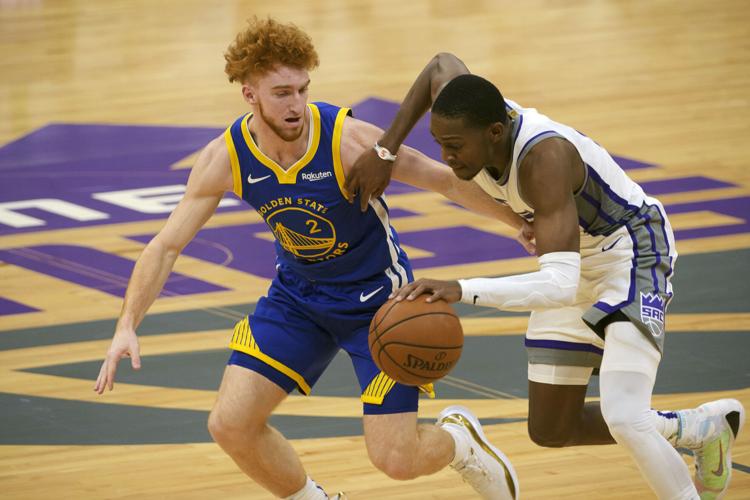Homeless, for real
Brushing directly against a wood-and-wire fence bordering Santa Cruz’s Hotel Paradox is a sprawling tent city for the homeless.
Maybe its presence offers some needed perspective.
Stanford, Santa Clara and San Jose State have been without a basketball home thanks to a Santa Clara County health order prohibiting games and practices. But the Cardinal was able to move in on the other side of the fence in Santa Cruz, into the stylishly restored hotel that is now a member of Marriott’s upscale “Autograph Collection” brand.
The Wildcats joined them at Hotel Paradox, too, on Friday night and Saturday afternoon before chartering home immediately after Saturday’s game.
Stanford was scheduled to stay longer, with a game set for Monday against Cal State Bakersfield, before breaking for Christmas and then meeting again on the Oregon-Oregon State road trip. There’s no telling if the Cardinal will be allowed to return to Stanford after that trip, either.
San Jose State, meanwhile, has housed its men’s and women’s basketball teams in Phoenix at the Arizona Grand Resort & Spa, where New Mexico State’s men’s team has been living for over a month now. And Santa Clara already played two games at Kaiser Permanente Arena.
Travel in the COVID-19 era
Playing Saturday’s game at Kaiser Permanente Arena instead of at Stanford’s Maples Pavilion was hardly the only thing different for the Wildcats.
After chartering into San Jose International Airport on Friday evening, the Wildcats took two buses instead of one to Santa Cruz, so as to allow players and staffing at least six feet of distance between each other. Upon arrival at the Hotel Paradox, each of the 14 players the Wildcats brought along was assigned their own room instead of doubling up, so as to again minimize contact.
And as of 9 p.m. Friday, although three tour buses were parked outside, exactly none of the Wildcats’ traveling party could be seen roaming around. They had been expected to spend nearly all of their time inside their rooms, with all meals delivered instead of in a hotel ballroom.
Most of them were boxed while Ryan Reynolds, UA’s director of basketball operations, said the “pregame meal” was delivered by room service.
And, of course, there was testing. Stanford provided the testing equipment for the day-of-game testing, clearing the way for Saturday’s game to finally happen.
Staying at home (with exceptions)
Santa Cruz County’s decision to adopt a regional stay-at-home order around the Bay Area on Thursday night due to low ICU bed vacancies put more doubt into Saturday’s game.
After all, Stanford left Santa Clara County in the first place because of a county health order.
But Santa Cruz County communications manager Jason Hoppin told the Santa Cruz Sentinel that he didn’t believe the games would be in jeopardy.
“I don’t think there’s anything to prevent that,” he said. “We don’t have a local order (on college sports), we’re following the state.”
The game went on, as Stanford’s scheduled game Monday is also expected to.
Ghost town
No Boardwalk, not even outside dining allowed now after new order hit Santa Cruz on Thursday night. pic.twitter.com/IYMRPnuXFf
— Bruce Pascoe (@BrucePascoe) December 19, 2020
But outside of basketball, Santa Cruz County’s new order turned the city from slow into a screeching halt.
The stricter rules that went into effect Thursday at 11:59 p.m. meant the heart of the beachfront Santa Cruz Boardwalk, already with its rides closed, was barricaded off even for walkers. Local restaurants, meanwhile, went from serving only outdoors to serving only to go – or via delivery services.
“When you tell them they can’t eat outside, they just leave,” said Ariana Perez, an employee at Sesame Korean Grill, a restaurant just three blocks from the arena that normally enjoys its busiest days on Saturdays.
Next door at the well-regarded Crazy Crab, the situation is just as extreme. Billing itself as having “Boiling Crab, Draft Beer,” there was no boiling and no drinking inside. Chairs were empty and heat lamps were stored inside, since there was no reason to put them outside anymore.
Danny Park, a manager at Crazy Crab, said business is down by about a half, though he was spending Saturday afternoon cleaning, without a soul around.
Normally, he said the Crazy Crab even serves fans headed to Kaiser Permanente Arena to watch the Santa Cruz Warriors, Golden State’s G League affiliate. But now there’s no point: No fans are allowed in the arena, and no food can be served on site.
“Before the (health order) it was pretty busy,” Park said.
Small crowd

Mostly empty seats at Kaiser Permanente Arena are shown during the first half of an NCAA college basketball game between Stanford and Arizona in Santa Cruz, Calif., Saturday, Dec. 19, 2020. (AP Photo/Jeff Chiu)
Not only were fans not allowed inside Kaiser Permanente Arena, but neither were there souls of almost any other type.
Aside from team players, staffers and officials, the only folks on hand were Pac-12 Networks announcers, a Stanford radio broadcaster, a public address announcer and just three media people: Reporters from the Star and Santa Cruz Sentinel, and a photographer from the Associated Press.
Nico’s house?

Golden State Warriors guard Nico Mannion (2) defends Sacramento Kings guard De'Aaron Fox (5) during the second half of a preseason NBA basketball game in Sacramento, Calif., Tuesday, Dec. 15, 2020. The Kings won the game 114-113. (AP Photo/Randall Benton)
Former Arizona guard Nico Mannion signed a two-way contract with the Golden State Warriors last month, meaning he could spend up to 50 days with the NBA club and the rest in the G League.
Mannion has effectively become the Warriors’ third point guard, showing shown some promise during the Warriors’ preseason, with seven assists over his first 22 minutes. But it still appears he may be playing at least some of the season at Kaiser Permanente Arena.
According to NBC Bay Area, Brad Wanamaker has solidified himself as Steph Curry’s backup at point guard, while Jordan Poole and Damion Lee are also chasing spots in the rotation. Warriors coach Steve Kerr has also spoken highly of guard Mychal Mulder, who could earn the team’s 15th roster spot and thus push Mannion down to Santa Cruz.
Then again, one of Mannion’s predecessors at Arizona proved that a two-way deal doesn’t mean a G League destiny: Allonzo Trier never served a minute with the Knicks’ G League team in 2018-19 after signing a two-way deal, playing so well that he forced the team to rip it up and offer him a standard NBA contract.
Another Lithuanian ‘brother’
Azuolas Tubelis might be a soft-spoken guy when it comes to the English language, but he had a chance to speak up a little Saturday without having to worry what the officials thought.
That’s because he went face-to-face with Stanford’s Lukas Kisunas, a fellow native of Vilnus, Lithuania — the same city that Tubelis and his twin brother, Tautvilas, are from.
Kisunas, a onetime UConn signee who was also an Arizona recruiting target before committing to the Cardinal in May 2018, also shares a club background with the Tubelis brothers. All of them have experience playing with the Vilnius Rytas club program, and have played in Adidas Next Generation tournaments. — Bruce Pascoe


